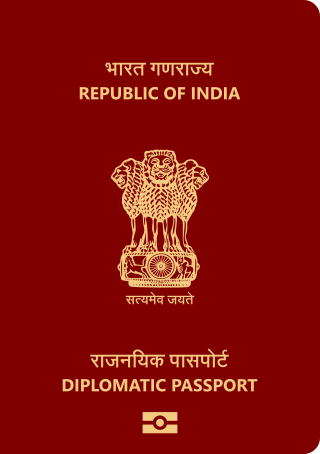
Diplomatic immunity is a principle of international law by which certain foreign government officials are recognized as having legal immunity from the jurisdiction of another country. It allows diplomats safe passage and freedom of travel in a host country and affords almost total protection from local lawsuits and prosecution.

A diplomatic mission or foreign mission is a group of people from a state or organization present in another state to represent the sending state or organization officially in the receiving or host state. In practice, the phrase usually denotes an embassy or high commission, which is the main office of a country's diplomatic representatives to another country; it is usually, but not necessarily, based in the receiving state's capital city. Consulates, on the other hand, are smaller diplomatic missions that are normally located in major cities of the receiving state. As well as being a diplomatic mission to the country in which it is situated, an embassy may also be a nonresident permanent mission to one or more other countries.
The LaGrand case was a legal action heard before the International Court of Justice (ICJ) which concerned the Vienna Convention on Consular Relations. In the case, the ICJ ruled that its own temporary court orders were legally binding and that the rights contained in the convention could not be denied by the application of domestic legal procedures.

The Vienna Convention on Diplomatic Relations of 1961 is an international treaty that defines a framework for diplomatic relations between independent countries. Its aim is to facilitate "the development of friendly relations" among governments through a uniform set of practices and principles; most notably, it codifies the longstanding custom of diplomatic immunity, in which diplomatic missions are granted privileges that enable diplomats to perform their functions without fear of coercion or harassment by the host country. The Vienna Convention is a cornerstone of modern international relations and international law and is almost universally ratified and observed; it is considered one of the most successful legal instruments drafted under the United Nations.

In international law, extraterritoriality or exterritoriality is the state of being exempted from the jurisdiction of local law, usually as the result of diplomatic negotiations.
Legal immunity, or immunity from prosecution, is a legal status wherein an individual or entity cannot be held liable for a violation of the law, in order to facilitate societal aims that outweigh the value of imposing liability in such cases. Such legal immunity may be from criminal prosecution, or from civil liability, or both. The most notable forms of legal immunity are parliamentary immunity and witness immunity. One author has described legal immunity as "the obverse of a legal power":
A party has an immunity with respect to some action, object or status, if some other relevant party – in this context, another state or international agency, or citizen or group of citizens – has no (power) right to alter the party's legal standing in point of rights or duties in the specified respect. There is a wide range of legal immunities that may be invoked in the name of the right to rule. In international law, immunities may be created when states assert powers of derogation, as is permitted, for example, from the European Convention on Human Rights "in times of war or other public emergency." Equally familiar examples include the immunities against prosecution granted to representatives and government officials in pursuit of their duties. Such legal immunities may be suspect as potential violations of the rule of law, or regarded as quite proper, as necessary protections for the officers of the state in the rightful pursuit of their duties.
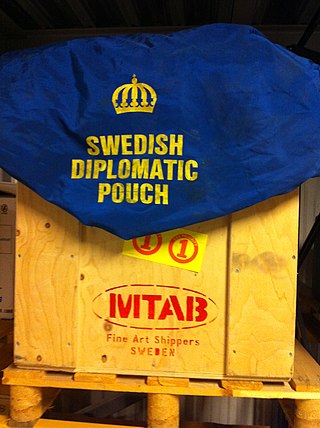
A diplomatic bag, also known as a diplomatic pouch, is a container with certain legal protections used for carrying official correspondence or other items between a diplomatic mission and its home government or other diplomatic, consular, or otherwise official entity. The physical concept of a "diplomatic bag" is flexible and it can take many forms.

The Matrícula Consular de Alta Seguridad, also known as the Mexican Consular Identification Card, is an identification card issued by the Government of Mexico through its consulate offices to Mexican nationals residing outside of Mexico. Also known as the Mexican CID card, it has been issued since 1871. The issue of the card has no bearing on immigration status in the foreign country they are residing in. The purpose of the card is to demonstrate that the bearer is a Mexican national living outside of Mexico. It includes a Government of Mexico issued ID number and bears a photograph and address outside of Mexico of the Mexican national to whom it is issued.
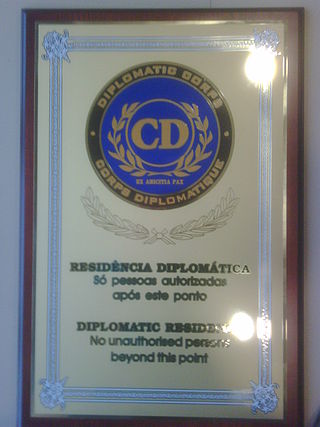
The diplomatic corps is the collective body of foreign diplomats accredited to a particular country or body.
Diplomatic rank is a system of professional and social rank used in the world of diplomacy and international relations. A diplomat's rank determines many ceremonial details, such as the order of precedence at official processions, table seatings at state dinners, the person to whom diplomatic credentials should be presented, and the title by which the diplomat should be addressed.

The Vienna Convention on Consular Relations is an international treaty that defines a framework for consular relations between sovereign states. It codifies many consular practices that originated from state custom and various bilateral agreements between states.

A consul is an official representative of a government who resides in a foreign country to assist and protect citizens of the consul's country, and to promote and facilitate commercial and diplomatic relations between the two countries.
Diplomatic law is that area of international law that governs permanent and temporary diplomatic missions. A fundamental concept of diplomatic law is that of diplomatic immunity, which derives from state immunity.

A consulate is the office of a consul. A type of diplomatic mission, it is usually subordinate to the state's main representation in the capital of that foreign country, usually an embassy. The term "consulate" may refer not only to the office of a consul, but also to the building occupied by the consul and the consul's staff. The consulate may share premises with the embassy itself.
The Algiers Accords of January 19, 1981 was a set of obligations and commitments undertaken independently by the United States and Iran to resolve the Iran hostage crisis, brokered by the Algerian government and signed in Algiers on January 19, 1981. The crisis began from the takeover of the American embassy in Tehran on November 4, 1979, where Iranian students took hostage of present American embassy staff. By this accord and its adherence, 52 American citizens were able to leave Iran. With the two countries unable to settle on mutually agreeable terms, particularly for quantitative financial obligations, Algerian mediators proposed an alternative agreement model - one where each country undertook obligations under the accords independently, rather than requiring both countries to mutually adhere to the same terms under a bilateral agreement.
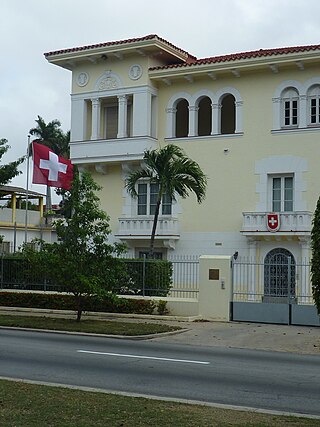
A protecting power is a country that represents another sovereign state—the protected power—in a third country where the protected power lacks its own formal diplomatic representation. It is common for protecting powers to be appointed when two countries break off diplomatic relations with each other. The protecting power is responsible for looking after the protected power's diplomatic property and citizens in the hosting state. If diplomatic relations were broken by the outbreak of war, the protecting power will also inquire into the welfare of prisoners of war and look after the interests of civilians in enemy-occupied territory.

The Ministry of Foreign Affairs, abbreviated KLN, is a ministry of the Government of Malaysia that is responsible for foreign affairs, Malaysian diaspora, foreigners in Malaysia, diplomacy, foreign relations, counter terrorism, bilateral affairs, multilateral affairs, ASEAN, international protocol, consular services, maritime affairs, and chemical weapons. It is currently based in Putrajaya. It is also widely known as Wisma Putra, which is also the name of its building in Putrajaya.

Consular identification (CID) cards are issued by some governments to their citizens who are living in foreign countries. They may be used, for example, by an embassy to allow its citizens to vote in a foreign country. Some jurisdictions accept them for some identification purposes. They are not certifications of legal residence within foreign countries, so CID card holders could be legal or illegal aliens.
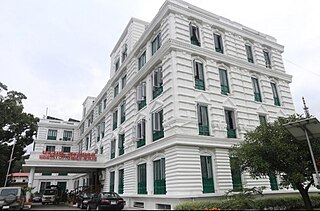
The Ministry of Foreign Affairs is responsible for conducting external affairs of the Federal Democratic Republic of Nepal. Ministry of Foreign Affairs represents other line ministries and the Government of Nepal while dealing with other states.

The Chief of Protocol (CoP) is a government official who heads the protocol department of a state, overseeing security, logistics and etiquette in diplomatic and national functions. A protocol department decides on diplomatic immunity and privileges, diplomatic host security, diplomatic use of airspace and it is the guardian of official etiquette. Advance protocol teams, usually headed by the Chief of Protocol, engage as first contact between governments for the planning of bilateral and multilateral summits and visits.














